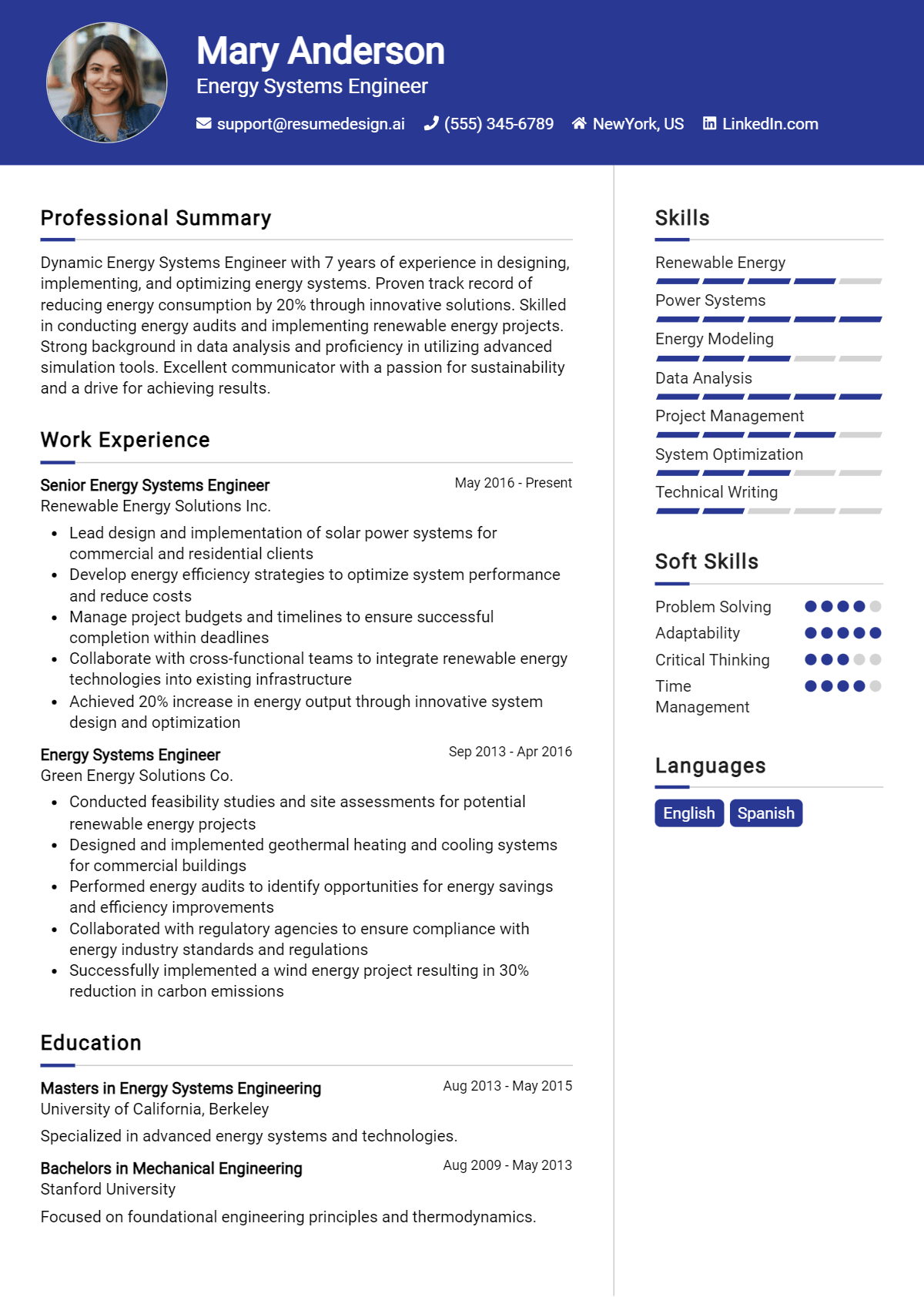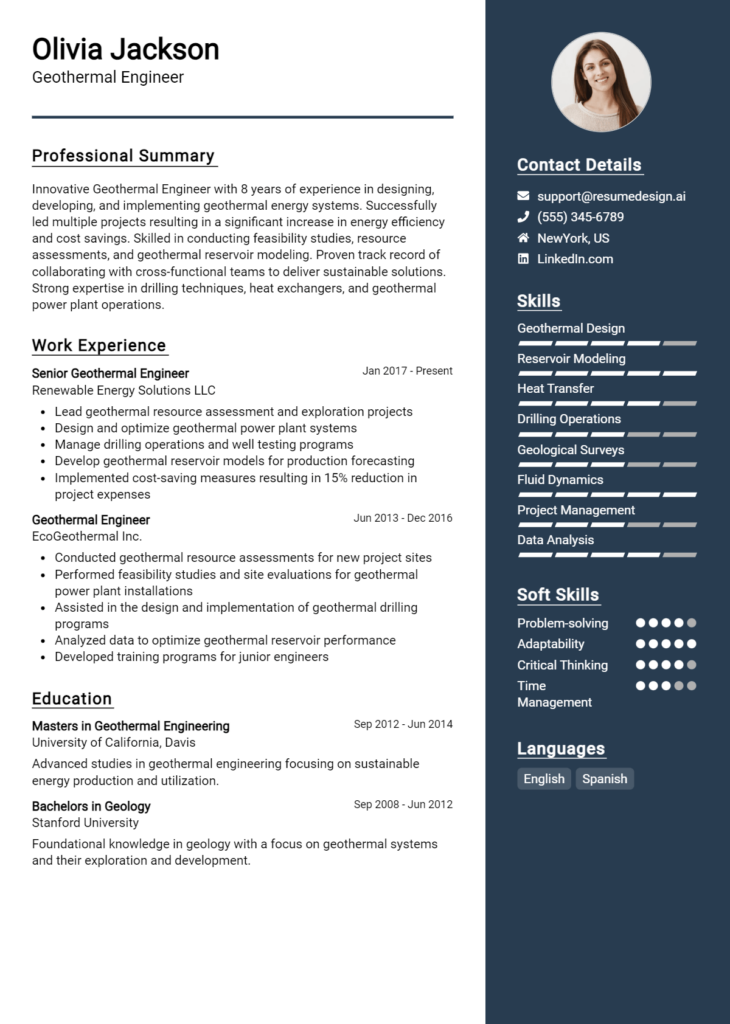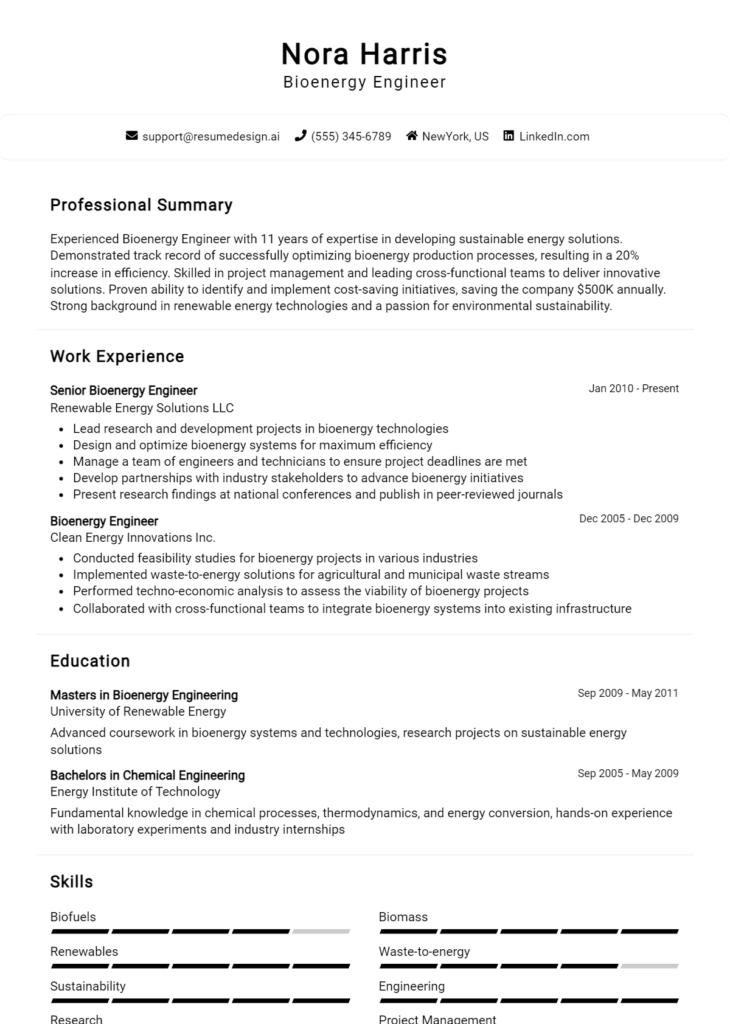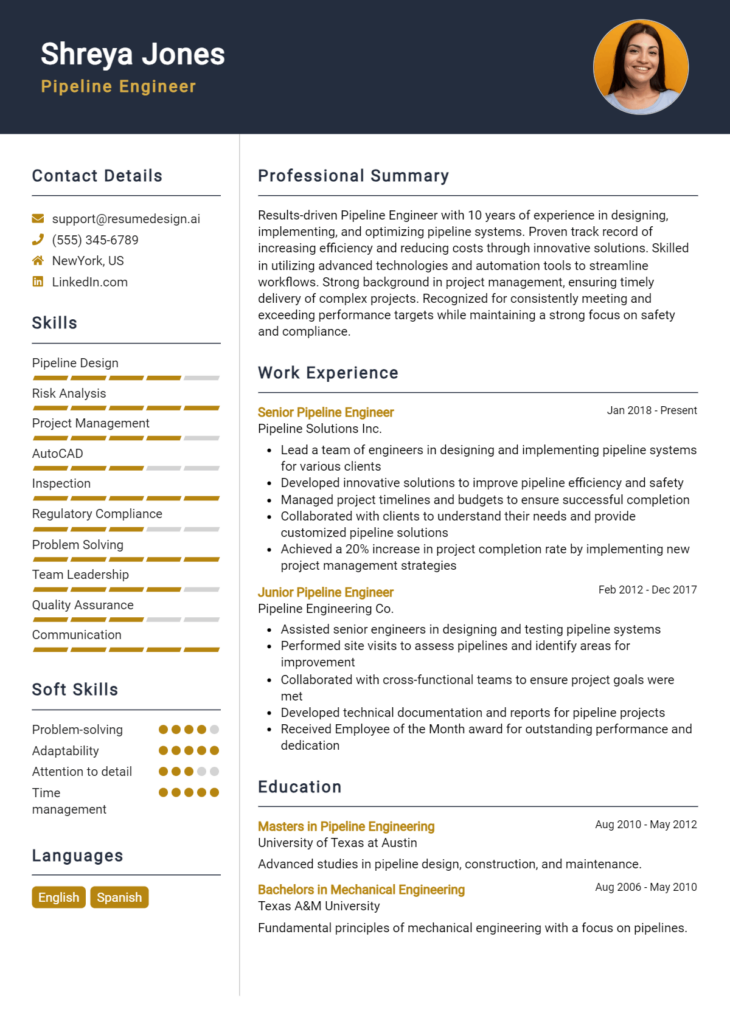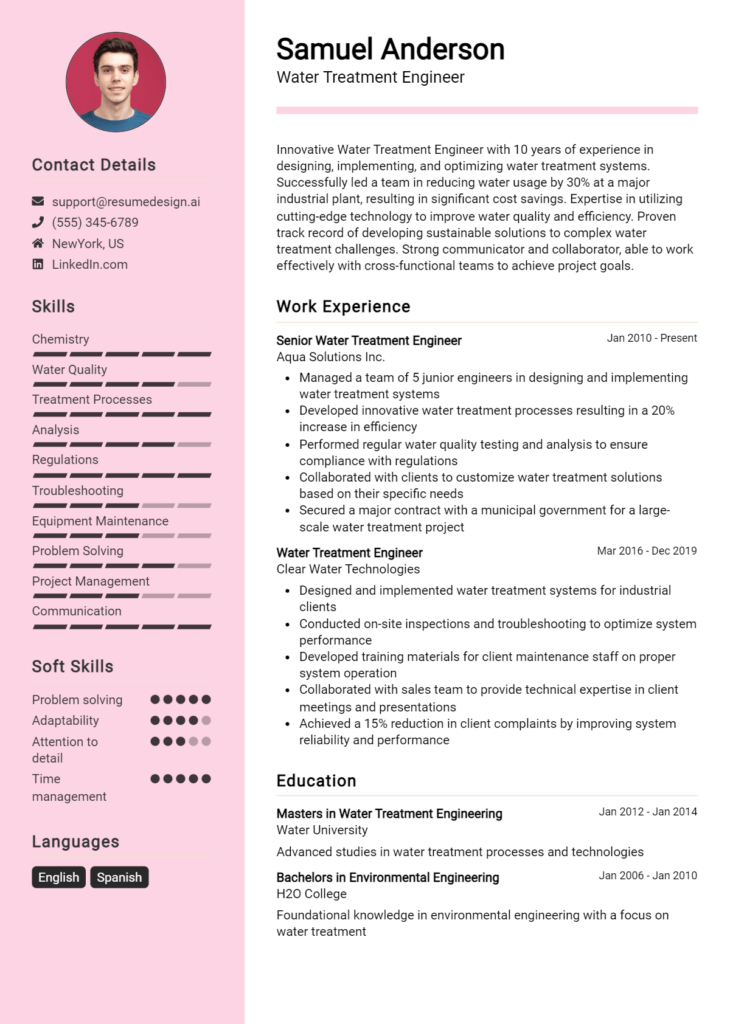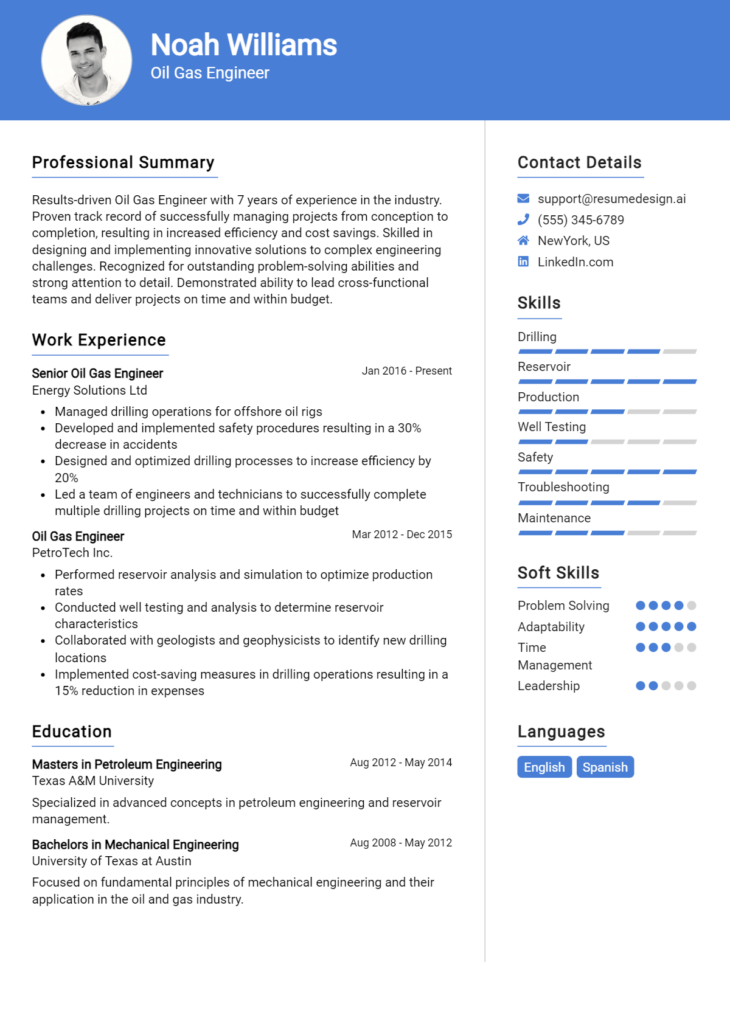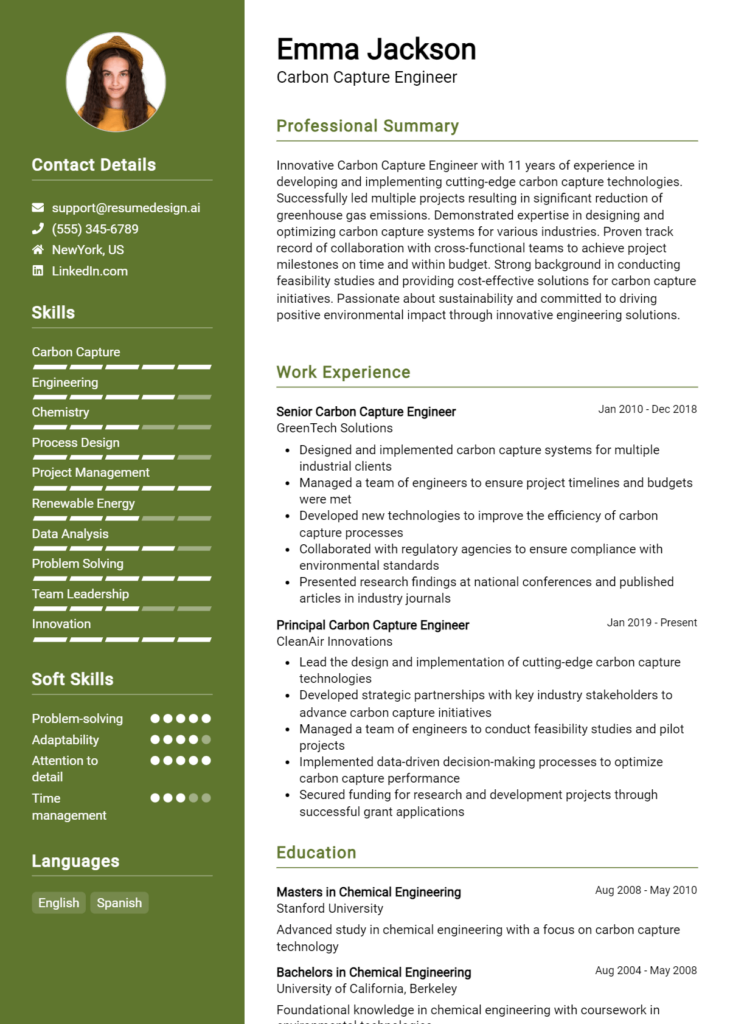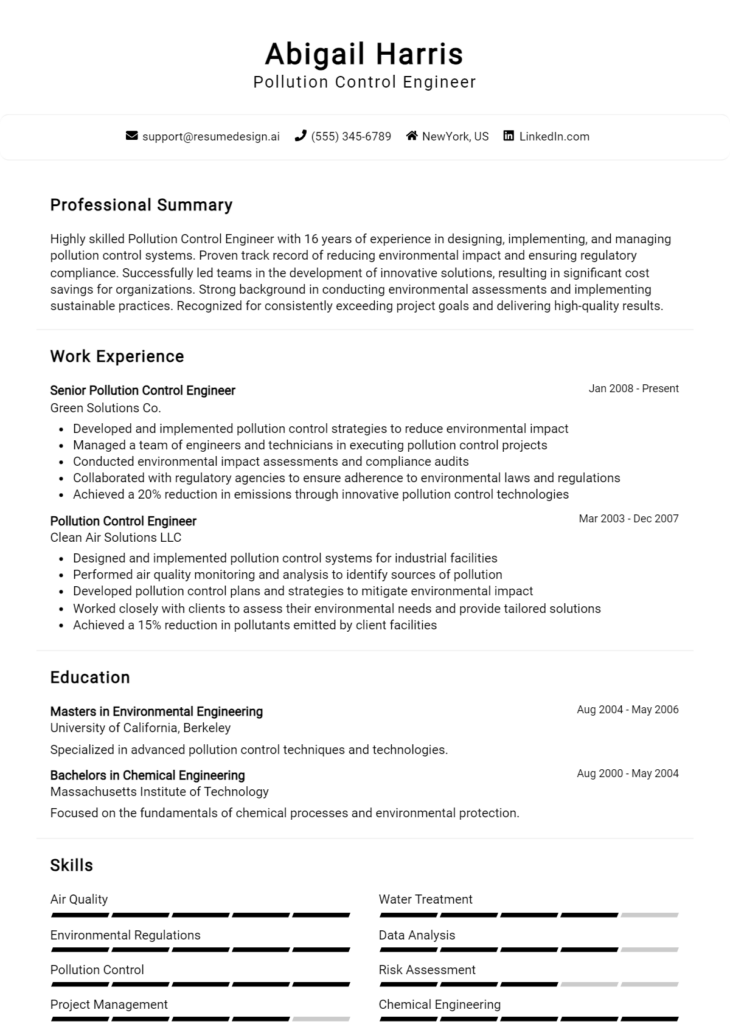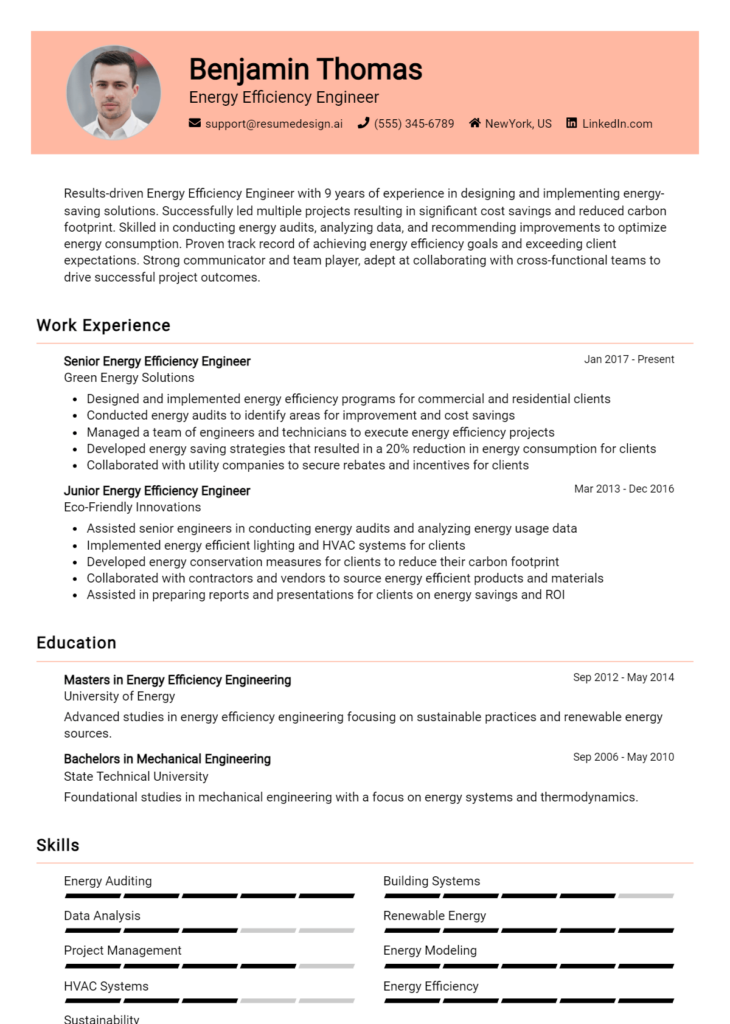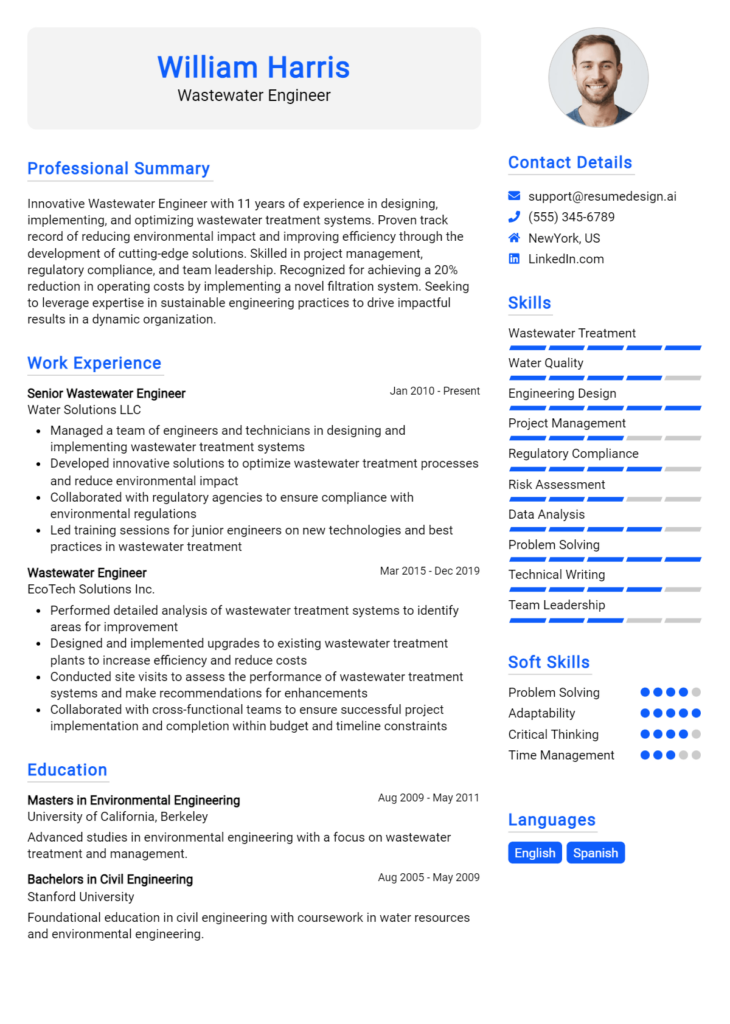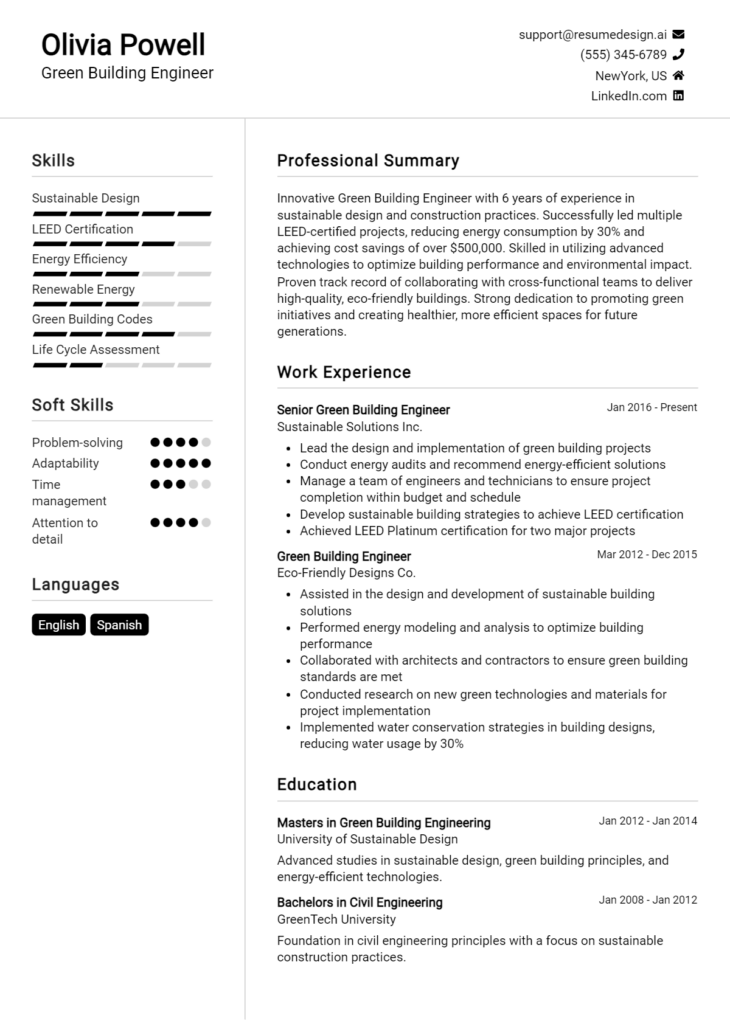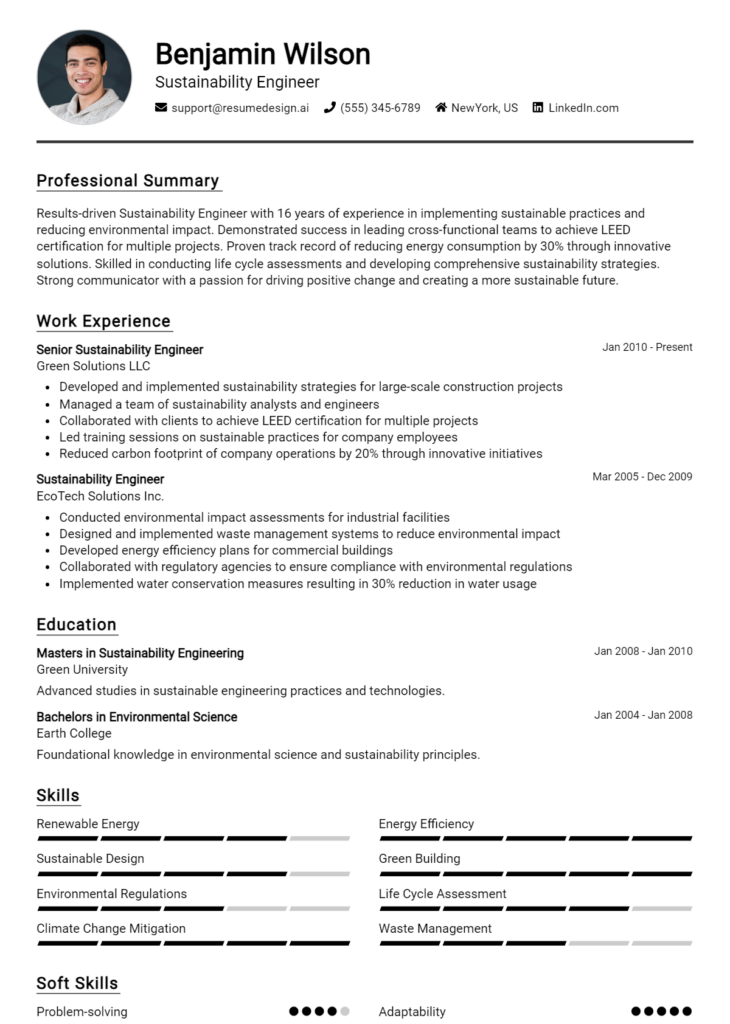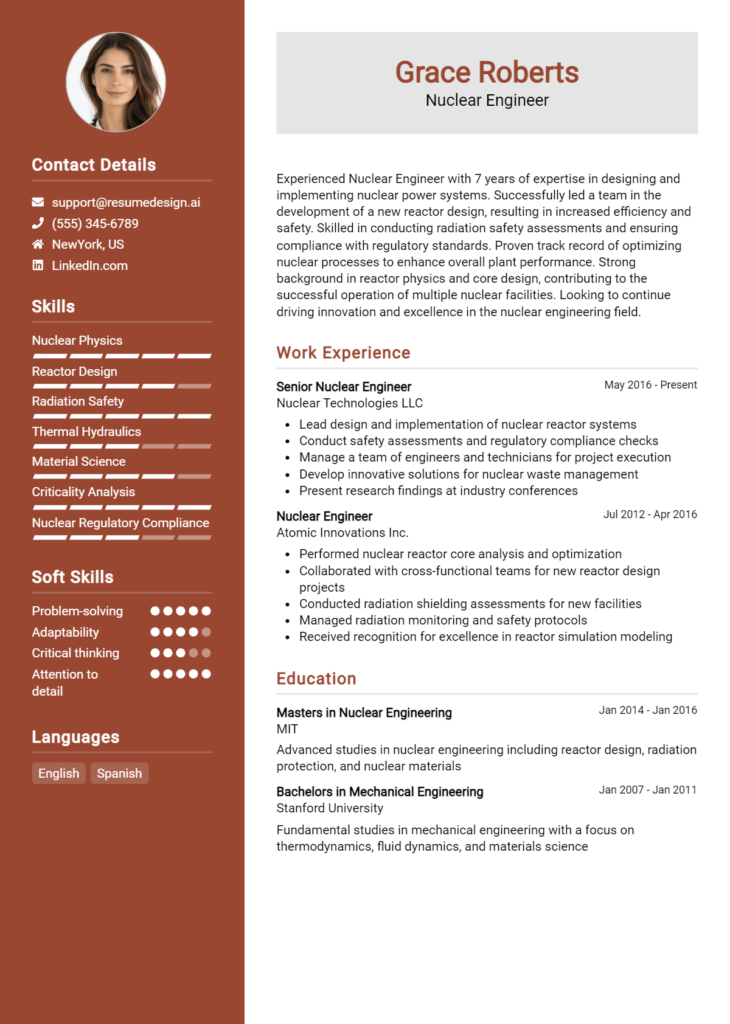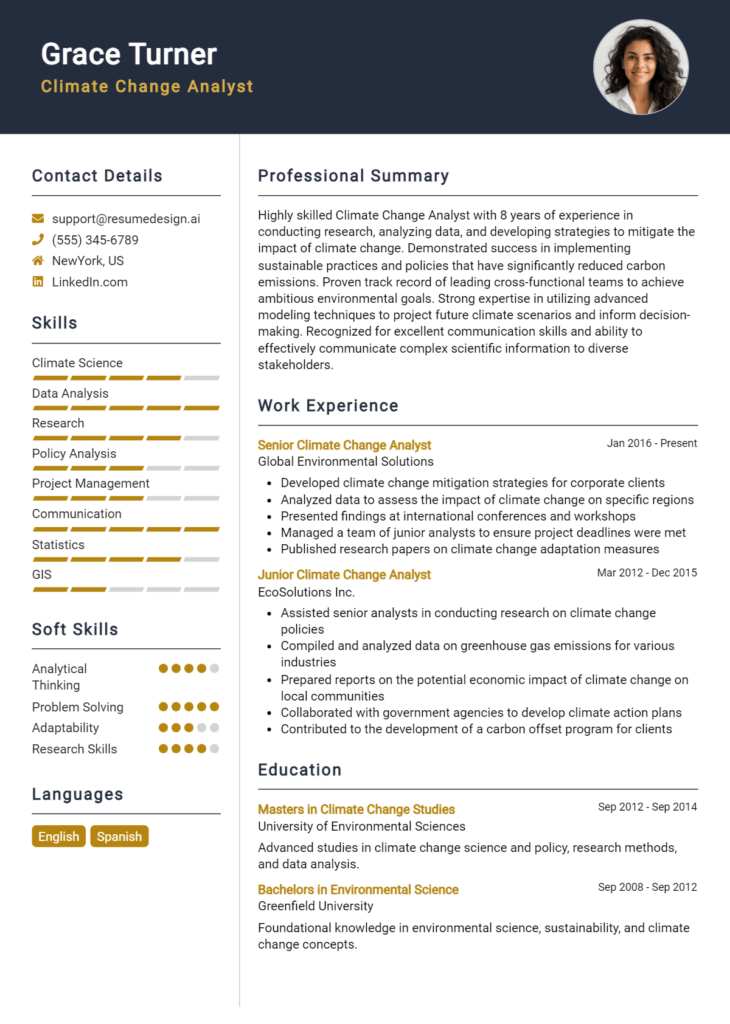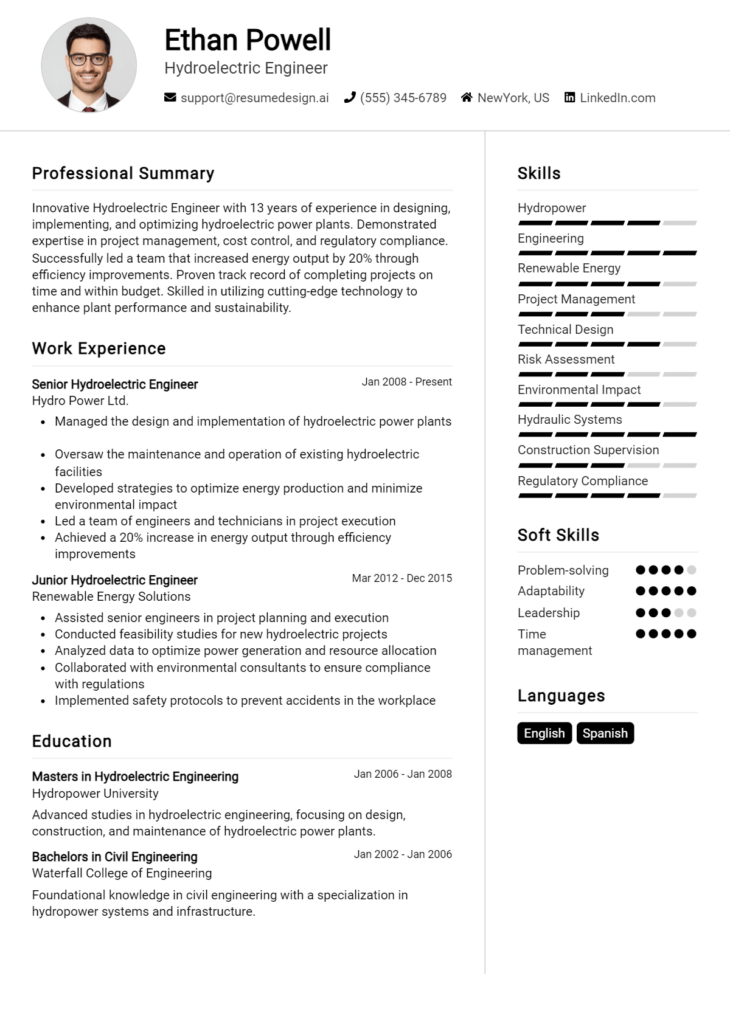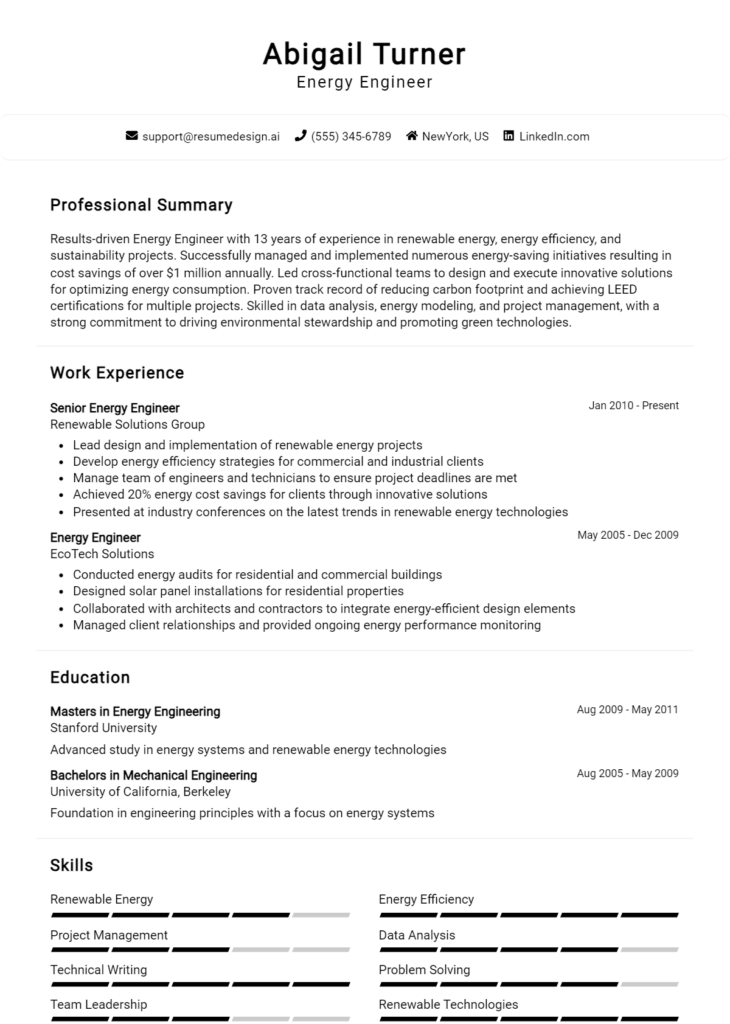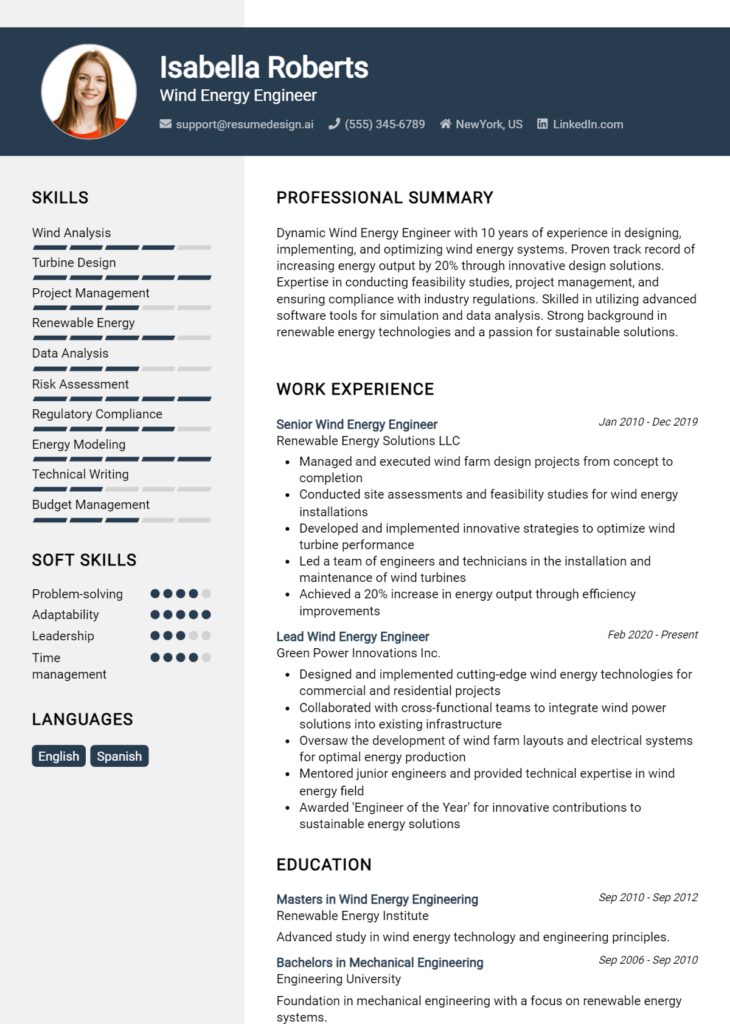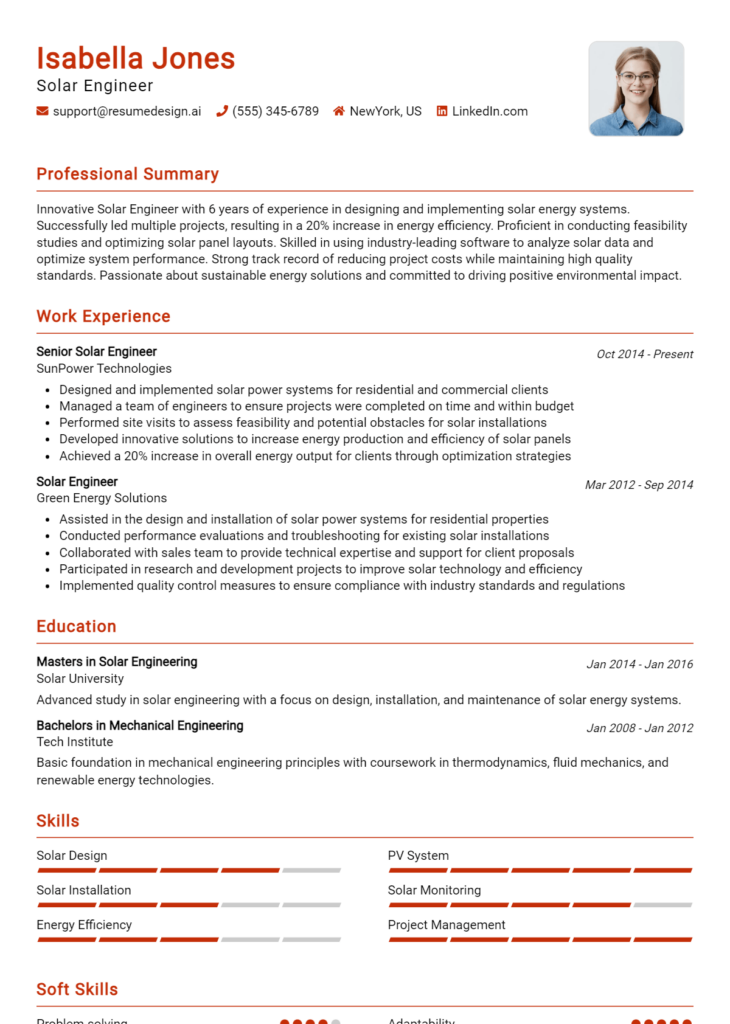Energy Systems Engineer Core Responsibilities
An Energy Systems Engineer plays a crucial role in designing, implementing, and optimizing energy systems, ensuring efficient energy use across various sectors. This professional must possess strong technical and operational skills, alongside exceptional problem-solving abilities, to effectively collaborate with departments such as engineering, operations, and project management. By leveraging these skills, Energy Systems Engineers contribute significantly to the organization’s sustainability goals. A well-structured resume can effectively highlight these qualifications, showcasing the candidate’s ability to bridge diverse functions and drive innovation in energy solutions.
Common Responsibilities Listed on Energy Systems Engineer Resume
- Design and analyze energy systems for efficiency and sustainability.
- Conduct feasibility studies and cost-benefit analyses for energy projects.
- Collaborate with cross-functional teams to implement energy solutions.
- Monitor system performance and recommend improvements.
- Develop energy management strategies to reduce consumption.
- Ensure compliance with industry regulations and standards.
- Perform simulations and modeling of energy systems.
- Prepare technical reports and presentations for stakeholders.
- Evaluate and select renewable energy technologies.
- Assist in project planning and resource allocation.
- Stay updated on emerging trends in energy systems engineering.
- Provide technical support during project execution and maintenance.
High-Level Resume Tips for Energy Systems Engineer Professionals
In today's competitive job market, a well-crafted resume is essential for Energy Systems Engineer professionals seeking to make a lasting impression on potential employers. Your resume often serves as the first point of contact between you and a hiring manager, and it needs to effectively showcase both your skills and achievements in a way that resonates with the specific demands of the energy sector. A standout resume not only highlights your technical expertise but also communicates your ability to drive results and contribute to innovative energy solutions. This guide will provide practical and actionable resume tips tailored specifically for Energy Systems Engineer professionals, helping you to present your qualifications in the most compelling way possible.
Top Resume Tips for Energy Systems Engineer Professionals
- Tailor your resume to the job description by incorporating keywords and phrases that reflect the specific requirements of the position.
- Highlight relevant experience in energy systems design, analysis, and implementation to demonstrate your practical knowledge and technical skills.
- Quantify your achievements by including metrics, such as energy savings percentages, project budgets managed, or reductions in emissions, to showcase your contributions.
- Emphasize industry-specific skills, such as proficiency in energy modeling software, renewable energy technologies, or regulatory compliance knowledge.
- Include any certifications or licenses relevant to the energy sector, such as LEED accreditation or Professional Engineer (PE) designation, which can enhance your credibility.
- Utilize a clean, professional format that makes your resume easy to read and visually appealing, ensuring that important information stands out.
- Incorporate a summary statement at the top of your resume that succinctly outlines your career goals and key qualifications in the energy systems field.
- Showcase teamwork and collaboration skills by detailing your experience working in interdisciplinary teams on energy projects.
- Keep your resume concise, ideally one page, focusing on the most relevant information to maintain the attention of busy hiring managers.
By implementing these tips, Energy Systems Engineer professionals can significantly increase their chances of landing a job in their field. A targeted and articulate resume not only highlights your qualifications but also conveys your commitment to the industry and readiness to tackle the challenges it presents. With a strong resume in hand, you will be well-equipped to stand out in a competitive job market and attract the attention of potential employers.
Why Resume Headlines & Titles are Important for Energy Systems Engineer
In the competitive field of energy systems engineering, a well-crafted resume headline or title serves as a crucial first impression for potential employers. As hiring managers sift through numerous applications, a strong headline can immediately capture their attention and succinctly convey a candidate's key qualifications in one impactful phrase. This brief yet powerful statement should be concise, relevant, and directly aligned with the specific energy systems engineering role being applied for, setting the tone for the rest of the resume and highlighting the candidate's unique value proposition.
Best Practices for Crafting Resume Headlines for Energy Systems Engineer
- Keep it concise: Aim for a headline that is no longer than 10-12 words.
- Be role-specific: Clearly indicate your expertise in energy systems engineering.
- Highlight key skills: Incorporate critical technical skills relevant to the position.
- Use action words: Start with strong verbs to convey your proactive approach.
- Include years of experience: Mention your experience level to establish credibility.
- Focus on achievements: Reference notable accomplishments to stand out.
- Tailor for each application: Adjust the headline to match the job description closely.
- Maintain professionalism: Ensure the tone reflects the seriousness of the engineering field.
Example Resume Headlines for Energy Systems Engineer
Strong Resume Headlines
Innovative Energy Systems Engineer with 8+ Years in Renewable Solutions
Experienced Energy Systems Engineer Specializing in Smart Grid Technologies
Results-Driven Energy Systems Engineer with Proven Project Management Expertise
Dynamic Energy Systems Engineer Focused on Sustainable Energy Solutions
Weak Resume Headlines
Engineer Seeking Opportunities
Energy Professional with Various Skills
The strong headlines are effective because they clearly communicate the candidate's specialization, experience, and accomplishments, making it easy for hiring managers to quickly grasp their expertise. In contrast, the weak headlines fail to impress as they lack specificity and do not provide any insight into the candidate's qualifications, ultimately blending into the sea of generic applications. By ensuring that resume headlines are impactful and tailored, candidates can significantly enhance their chances of making a positive impression and securing an interview.
Writing an Exceptional Energy Systems Engineer Resume Summary
A well-crafted resume summary is crucial for an Energy Systems Engineer as it serves as the first impression for hiring managers. In a competitive job market, a strong summary quickly captures attention by succinctly showcasing key skills, relevant experience, and notable accomplishments that align with the specific job role. This concise and impactful introduction sets the tone for the entire resume, making it essential to tailor the summary to the job description to enhance the chances of standing out among other candidates.
Best Practices for Writing a Energy Systems Engineer Resume Summary
- Quantify Achievements: Use specific numbers and metrics to highlight your successes, making the impact of your work clearer.
- Focus on Relevant Skills: Emphasize skills that are directly related to energy systems engineering, such as energy efficiency, renewable energy technologies, or project management.
- Tailor for the Job Description: Customize your summary for each job application to reflect the specific requirements and responsibilities outlined in the posting.
- Keep It Concise: Aim for 2-4 sentences that distill your qualifications without overwhelming the reader with excessive detail.
- Highlight Certifications and Education: Mention any relevant certifications or degrees that enhance your credibility as an energy systems engineer.
- Showcase Problem-Solving Abilities: Include examples of how you've addressed challenges or improved processes in your previous roles.
- Use Action-Oriented Language: Start sentences with powerful action verbs to convey confidence and initiative.
- Reflect Your Passion: Demonstrate your enthusiasm for energy systems and sustainability to connect with potential employers on a personal level.
Example Energy Systems Engineer Resume Summaries
Strong Resume Summaries
Results-driven Energy Systems Engineer with over 5 years of experience optimizing energy performance in industrial settings. Successfully led a project that reduced energy consumption by 30%, saving the company $150,000 annually. Proficient in renewable energy technologies, energy modeling, and regulatory compliance.
Dynamic Energy Systems Engineer with expertise in integrating solar energy solutions into urban infrastructure. Achieved a 25% increase in system efficiency through innovative design and implementation strategies, contributing to a $500,000 increase in project profitability.
Dedicated Energy Systems Engineer with a Master’s in Renewable Energy Engineering and a proven track record of managing high-impact projects. Spearheaded a cross-functional team in a wind energy initiative that generated 2MW of renewable power, exceeding performance targets by 15%.
Weak Resume Summaries
Energy engineer with experience looking for a job. I have skills in energy systems and want to work in a good company.
I am an energy systems engineer who has worked on various projects and has a background in engineering. I am looking for opportunities in the energy sector.
The strong resume summaries stand out because they provide quantifiable results, specific skills, and direct relevance to the energy systems engineering role. They highlight achievements that demonstrate impact and expertise. In contrast, the weak summaries are vague, lack measurable outcomes, and fail to convey a clear picture of the candidate's qualifications, making it difficult for hiring managers to see their potential value.
Work Experience Section for Energy Systems Engineer Resume
The work experience section of an Energy Systems Engineer resume is essential as it serves as a critical platform to demonstrate a candidate's technical skills, leadership capabilities, and ability to produce high-quality results in energy systems projects. This section not only showcases the candidate's professional journey but also highlights their practical experience in managing teams, implementing solutions, and achieving measurable outcomes. By quantifying achievements and aligning work experiences with industry standards, candidates can effectively convey their value to potential employers, making it easier for hiring managers to recognize their qualifications and fit for the role.
Best Practices for Energy Systems Engineer Work Experience
- Start each bullet point with strong action verbs to convey impact.
- Quantify achievements with specific metrics, such as energy savings percentages or project completion timelines.
- Highlight technical skills relevant to energy systems, such as simulation software or renewable energy technologies.
- Include team management experiences, demonstrating leadership and collaboration within multidisciplinary teams.
- Align your experience with industry standards and best practices to showcase your familiarity with current trends.
- Use clear and concise language to make your contributions easily understandable.
- Focus on results-oriented statements that reflect your ability to deliver high-quality products.
- Tailor your work experience to the job description, emphasizing the most relevant experiences first.
Example Work Experiences for Energy Systems Engineer
Strong Experiences
- Led a team of 5 engineers in the design and implementation of a solar energy project, resulting in a 30% reduction in energy costs for the client.
- Developed and optimized energy management systems for industrial clients, achieving an average energy efficiency improvement of 25% across multiple facilities.
- Managed a cross-functional team to deliver a renewable energy feasibility study, which secured $2 million in funding for future development.
- Implemented a predictive maintenance system using IoT technology, reducing downtime by 40% and saving the company $100,000 annually.
Weak Experiences
- Worked on energy systems projects.
- Helped with various engineering tasks related to energy.
- Participated in team meetings and discussions.
- Assisted in the design of some energy solutions.
The examples listed above are considered strong because they provide clear, quantifiable outcomes and demonstrate leadership and collaboration in significant projects. They highlight specific achievements and technical expertise, making a compelling case for the candidate's capabilities. In contrast, the weak experiences lack detail, specificity, and measurable results, making it difficult for employers to assess the candidate's true impact or skills in the energy systems engineering field.
Education and Certifications Section for Energy Systems Engineer Resume
The education and certifications section of an Energy Systems Engineer resume plays a crucial role in establishing the candidate's academic foundation and professional credibility. This section not only highlights the candidate's relevant degrees but also showcases industry-recognized certifications and specialized training that demonstrate a commitment to continuous learning and staying abreast of technological advancements. By including pertinent coursework, certifications, and training programs, candidates can effectively align their qualifications with the specific demands of the job role, enhancing their appeal to potential employers.
Best Practices for Energy Systems Engineer Education and Certifications
- Prioritize relevant degrees in engineering, environmental science, or renewable energy.
- List certifications from recognized industry organizations, such as LEED, PMP, or NABCEP.
- Include coursework that directly relates to energy systems, such as thermodynamics, energy management, and sustainable design.
- Highlight any advanced degrees or specialized training that set you apart from other candidates.
- Be specific about certification dates and renewal status to show commitment to ongoing education.
- Consider including online courses or workshops that enhance your skill set and knowledge of current trends.
- Use clear formatting to make this section easy to read and visually appealing.
- Tailor this section to match the job description, focusing on the most relevant qualifications.
Example Education and Certifications for Energy Systems Engineer
Strong Examples
- M.S. in Energy Systems Engineering, University of Renewable Energy, Graduated May 2022
- Certified Energy Manager (CEM), Association of Energy Engineers, Certified March 2023
- Coursework: Renewable Energy Systems, Energy Efficiency Technologies, and Advanced Thermodynamics
- LEED Green Associate, U.S. Green Building Council, Certified January 2023
Weak Examples
- B.A. in Psychology, University of Generic Studies, Graduated May 1990
- Basic First Aid Certification, Red Cross, Certified July 2015
- Coursework: Introduction to Sociology, Art History
- Certification in Basic Computer Skills, Local Community College, Completed December 2018
The strong examples are considered effective because they align directly with the qualifications and skills necessary for the role of an Energy Systems Engineer, showcasing relevant degrees, industry-recognized certifications, and applicable coursework. Conversely, the weak examples lack relevance to the field, featuring degrees and certifications that do not directly pertain to energy systems, thereby diminishing the candidate's credibility and suitability for the position.
Top Skills & Keywords for Energy Systems Engineer Resume
As an Energy Systems Engineer, showcasing your skills on your resume is crucial for standing out in a competitive job market. Employers look for candidates who not only have the technical expertise to design and optimize energy systems but also possess the interpersonal abilities necessary to collaborate effectively with diverse teams. A well-crafted resume that highlights both hard and soft skills can significantly enhance your chances of landing an interview. By incorporating relevant skills and demonstrating your work experience, you can present a compelling case for your candidacy.
Top Hard & Soft Skills for Energy Systems Engineer
Soft Skills
- Strong communication skills
- Team collaboration
- Problem-solving aptitude
- Critical thinking
- Adaptability to change
- Project management
- Attention to detail
- Creativity in design
- Time management
- Leadership abilities
- Negotiation skills
- Interpersonal skills
- Customer service orientation
- Conflict resolution
- Ethical judgment
Hard Skills
- Proficiency in energy modeling software (e.g., HOMER, EnergyPlus)
- Knowledge of renewable energy technologies
- Expertise in power systems analysis
- Familiarity with grid integration and smart grid technologies
- Proficiency in data analysis and simulation tools
- Understanding of energy efficiency standards and regulations
- Ability to conduct feasibility studies and risk assessments
- Experience with CAD software for system design
- Knowledge of energy storage systems
- Familiarity with HVAC systems and controls
- Proficiency in programming languages (e.g., Python, MATLAB)
- Understanding of electrical and mechanical systems
- Experience with energy management systems (EMS)
- Knowledge of environmental impact assessments
- Ability to prepare technical reports and presentations
Stand Out with a Winning Energy Systems Engineer Cover Letter
Dear [Hiring Manager's Name],
I am writing to express my enthusiasm for the Energy Systems Engineer position at [Company Name], as advertised on [Where You Found the Job Posting]. With a Master's degree in Energy Systems Engineering from [Your University] and over [X years] of hands-on experience in renewable energy projects, I am excited about the opportunity to contribute my expertise in designing and optimizing energy systems to help [Company Name] achieve its sustainability goals.
In my previous role at [Your Previous Company], I successfully led a project that integrated solar and wind energy solutions, which resulted in a 30% reduction in operational costs while significantly lowering our carbon footprint. My technical proficiency in simulation tools such as MATLAB and HOMER, combined with my strong analytical skills, enabled me to assess energy production and consumption patterns effectively. Additionally, I have collaborated with cross-functional teams to develop innovative strategies for energy management and efficiency, ensuring compliance with industry standards and regulations.
I am particularly drawn to [Company Name] because of its commitment to advancing clean energy technologies and its innovative approach to energy solutions. I am eager to bring my background in energy system analysis and project management to your team and contribute to projects that not only meet client needs but also promote environmental sustainability. I am confident that my proactive mindset and problem-solving abilities will add value to your organization and help drive impactful energy initiatives.
Thank you for considering my application. I look forward to the opportunity to discuss how my skills and experiences align with the goals of [Company Name]. I am excited about the prospect of contributing to your team and helping shape the future of energy systems.
Sincerely,
[Your Name]
[Your Phone Number]
[Your Email Address]
Common Mistakes to Avoid in a Energy Systems Engineer Resume
When crafting a resume for an Energy Systems Engineer position, it's crucial to highlight your technical skills, relevant experience, and educational background. However, many candidates make common mistakes that can detract from their qualifications and impact their chances of securing an interview. By being aware of these pitfalls, you can create a more effective resume that showcases your expertise in energy systems engineering.
Overloading with Technical Jargon: While it's important to demonstrate your technical expertise, using too much jargon can alienate hiring managers who may not share the same level of technical knowledge. Keep your language clear and concise.
Ignoring Keywords from the Job Description: Many companies use applicant tracking systems (ATS) to filter resumes. Failing to incorporate relevant keywords from the job description may result in your resume being overlooked.
Using a Generic Template: Resumes that look overly generic can give the impression that you're not genuinely interested in the position. Tailor your resume to align with the specific requirements and culture of the company.
Neglecting Soft Skills: While technical skills are vital in engineering roles, soft skills such as teamwork, communication, and problem-solving are equally important. Be sure to highlight these skills and provide examples of how you've used them in past roles.
Listing Responsibilities Instead of Achievements: Instead of merely listing job responsibilities, focus on your accomplishments in previous positions. Use quantifiable metrics to demonstrate your impact, such as energy savings achieved or projects completed ahead of schedule.
Failing to Include Relevant Certifications: Energy systems engineering often requires specific certifications, such as LEED or PMP. Omitting these credentials can make your resume less competitive.
Not Highlighting Continuous Learning: The energy sector is constantly evolving. Failing to showcase your commitment to continuous education, such as workshops, seminars, or courses, can signal to employers that you may not be keeping up with industry advancements.
Using an Unprofessional Email Address: Your email address is part of your professional branding. Avoid using casual or inappropriate email addresses, and opt for a simple format that includes your name.
Conclusion
As an Energy Systems Engineer, your role encompasses a wide range of responsibilities, including the design, implementation, and optimization of energy systems that are both efficient and sustainable. Throughout this article, we discussed key skills such as proficiency in energy modeling software, strong analytical abilities, and a deep understanding of renewable energy technologies. Additionally, collaboration with multidisciplinary teams and effective communication are essential traits for success in this field.
In conclusion, it's crucial to ensure that your resume accurately reflects these competencies and experiences. A well-crafted resume can significantly enhance your chances of landing your desired position in this competitive industry. We encourage you to take a moment to review and update your Energy Systems Engineer resume.
To assist you in this process, there are valuable resources available, including resume templates, which can guide you in formatting your document professionally. Additionally, you might consider using a resume builder to streamline the creation of your resume, or explore resume examples to gain inspiration from successful candidates. Don’t forget to complement your resume with a polished application by utilizing our cover letter templates.
Take action today and elevate your application materials to stand out in the evolving field of energy systems engineering!

